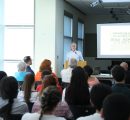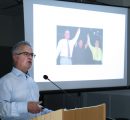
Northern Ireland 20 Years after Good Friday Agreement
2 min readYEREVAN, Armenia – On September 27, the American University of Armenia (AUA) Political Science and International Affairs (PSIA) program hosted a seminar by Alex Attwood, Belfast City Councillor, on “Northern Ireland 20 Years after the Good Friday Agreement.” Attwood, a veteran politician of Northern Ireland, visited Armenia as part of a project on Engaging society and decision-makers in dialogue for peace over the Nagorno-Karabakh conflict funded by the UK Government’s Conflict, Stability and Security Fund and implemented by the Caucasus Institute.
Following opening remarks and introduction by Dr. Vahram Ter-Matevosyan, PSIA Program Chair, the speaker took the floor. Attwood first drew a comparison of the complex situation in Mosul, a city in northern Iraq, with the situation in Ireland. Afterwards, he covered the Good Friday Agreement signed in Belfast in 1998. This agreement, he explained, comprises two inter-related documents: the Multi-Party Agreement of Northern Ireland’s political parties and the British and Irish Agreement. Attwood elaborated on how the Good Friday Agreement was signed, the dialogues preceding this agreement, and the pending unresolved issues.
According to the speaker, twenty years ago Northern Ireland embarked on creating a new order of politics, which involved democratic dialogue with representatives of the armed groups; supportive stance for civil rights; collaboration with citizens and community in building a new order; building public confidence; a government partnership between the two main political traditions; and reconciliation. Twenty years later, the intensity and quality of democratic dialogue has withered; issues of cultural and social rights have shaped the political impasse; citizen input is marginal; and politics is in retreat. Attwood finished his talk touching upon the issues that currently exist.
The lecture concluded with questions and answers. The attendees were most interested to hear more about other aspects of domestic politics in Northern Ireland, such as issues of identity, traditions, flag, and culture.
The AUA PSIA program equips students with advanced analytical reasoning, critical thinking, and communication skills through the study of political science and international affairs, emphasizing local and global perspectives and practical applications of theory. The program aims to provide world-class research and teaching, through which graduates can best contribute to the development of the nation.






